Preparing for a SQL interview can be a daunting task, but knowing the most commonly asked questions can help you feel more confident. In this post, we’ll explore the top five SQL interview questions, complete with detailed examples and explanations. Each question focuses on essential SQL concepts that hiring managers often prioritize. Let’s dive in!
1. Aggregation Questions
The first question you are likely to encounter in a SQL interview revolves around aggregation. Aggregation functions allow you to summarize data, providing insights into total values, averages, counts, and more.
For instance, you might be asked, “What is the total retail price of all cars?” To answer this, you would use the SUM function:
SELECT SUM(retail_price) AS TotalRetailPrice FROM cars;In addition to summing values, you should also be comfortable using other aggregation functions such as:
- AVG – to find the average value.
- COUNT – to count the number of rows.
- MIN – to find the minimum value.
- MAX – to find the maximum value.
For example, if asked for the average retail price, you would write:
SELECT AVG(retail_price) AS AverageRetailPrice FROM cars;Moreover, you can aggregate data based on specific categories, like the make of the car. Here’s how:
SELECT make, SUM(retail_price) AS TotalRetailPrice
FROM cars
GROUP BY make;Remember, using GROUP BY is crucial when you want to aggregate data based on a specific column.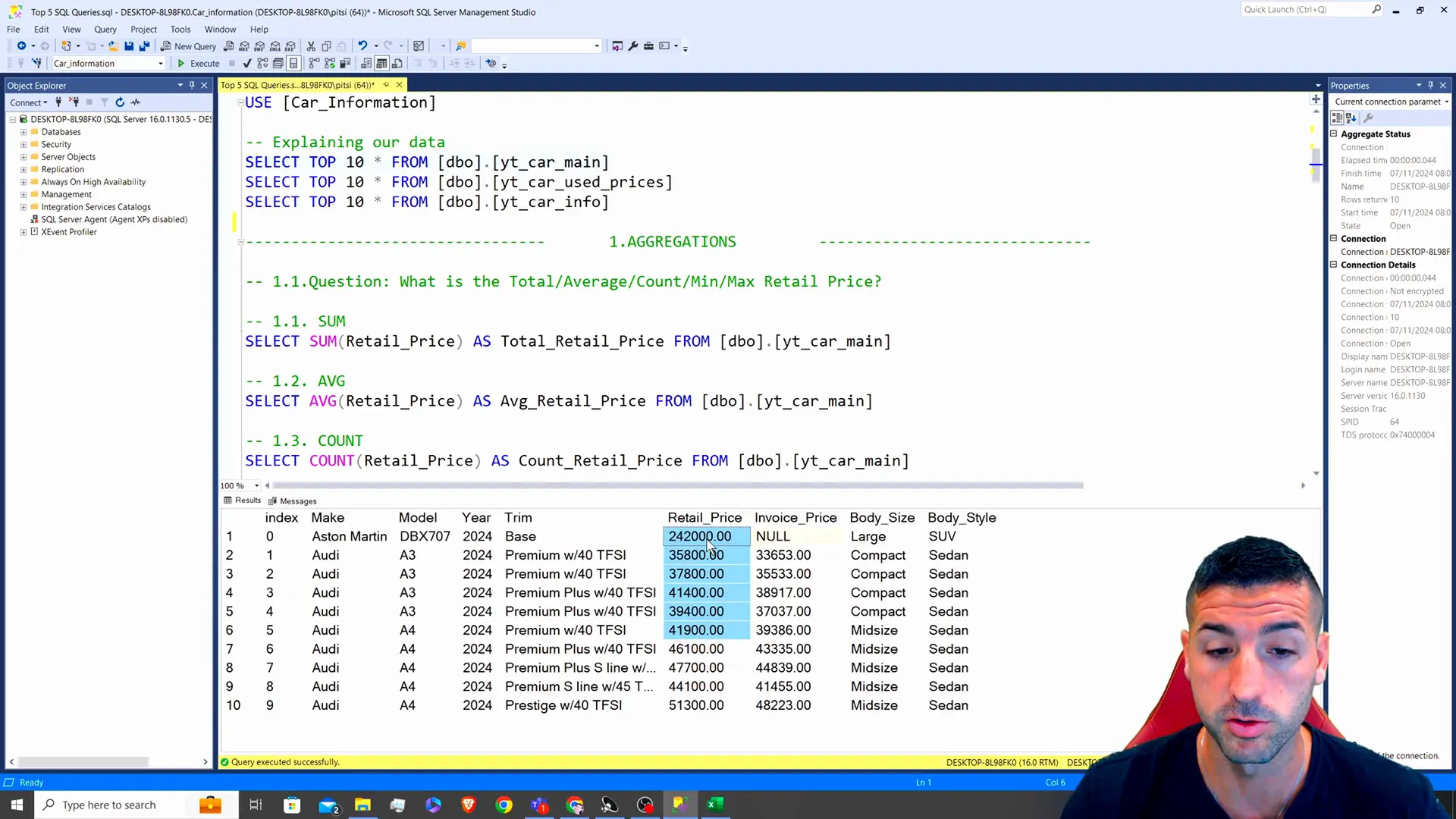
2. Conditions and Filters
Next, you should expect questions about filtering data. This is essential for retrieving specific information based on certain conditions.
For example, if asked to show all Audi cars, you would use a WHERE clause:
SELECT * FROM cars WHERE make = 'Audi';You might also need to apply more complex conditions. For instance, if asked to show all cars not of model A3:
SELECT * FROM cars WHERE model != 'A3';Another common request could involve filtering based on a range of years:
SELECT * FROM cars WHERE year IN (2023, 2024);Additionally, you might be required to filter based on multiple conditions, such as:
SELECT * FROM cars WHERE retail_price > 100000 AND make = 'Mercedes-Benz';Or using an OR condition:
SELECT * FROM cars WHERE retail_price > 100000 OR body_style = 'KU';Lastly, you may need to filter text data using the LIKE operator, for instance:
SELECT * FROM cars WHERE make LIKE '%Mercedes%';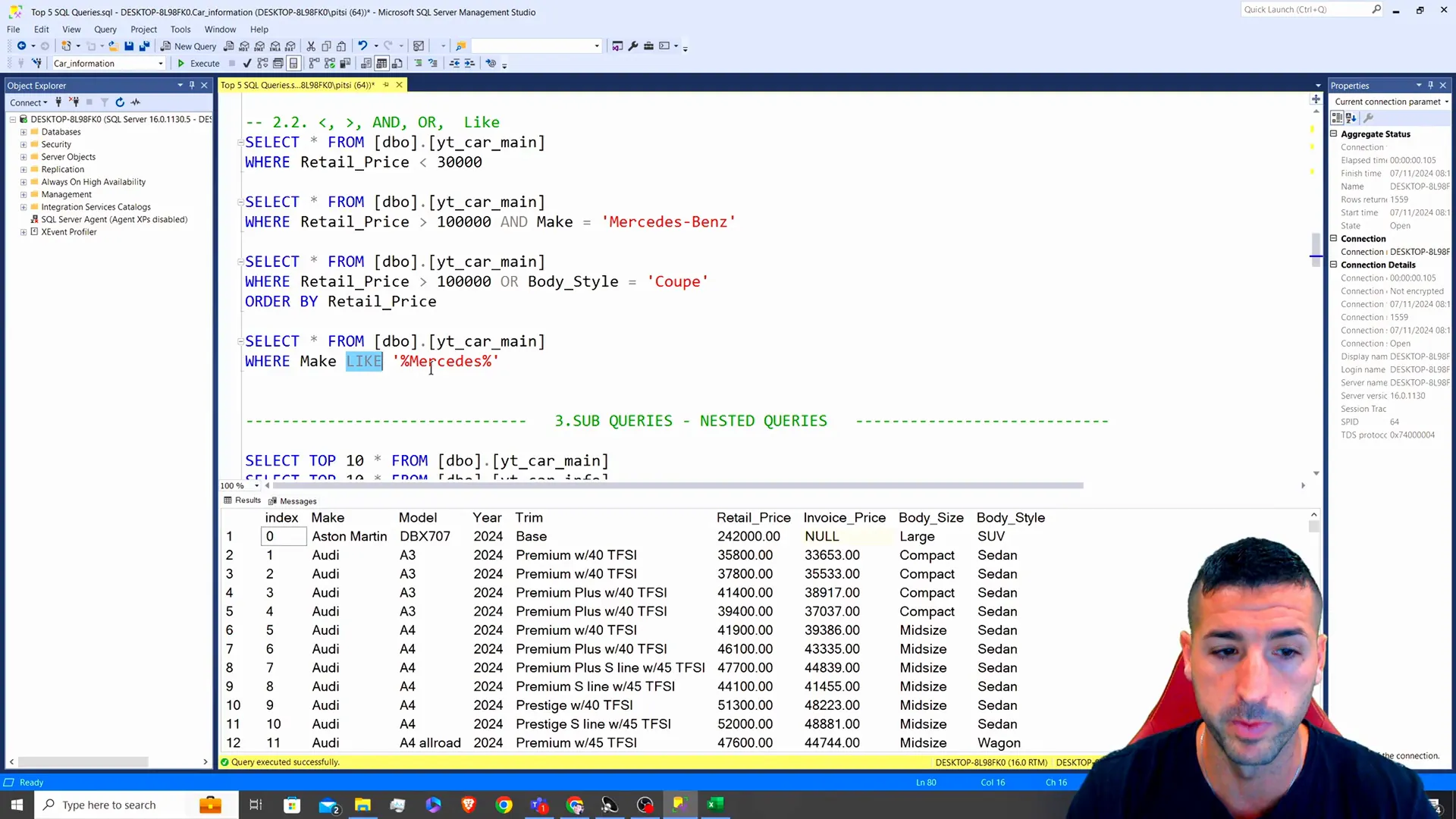
3. Subqueries and Nested Queries
Subqueries are another critical area to master. These are queries nested within another query, allowing for more complex data retrieval.
For instance, if asked, “What is the total retail price for four-wheel drive cars?” you would first identify the relevant cars from a secondary table:
SELECT SUM(retail_price)
FROM cars
WHERE index IN (SELECT DISTINCT index FROM car_info WHERE drive_train = '4WD');Here, the inner query retrieves the indexes of four-wheel drive cars, while the outer query calculates the total retail price.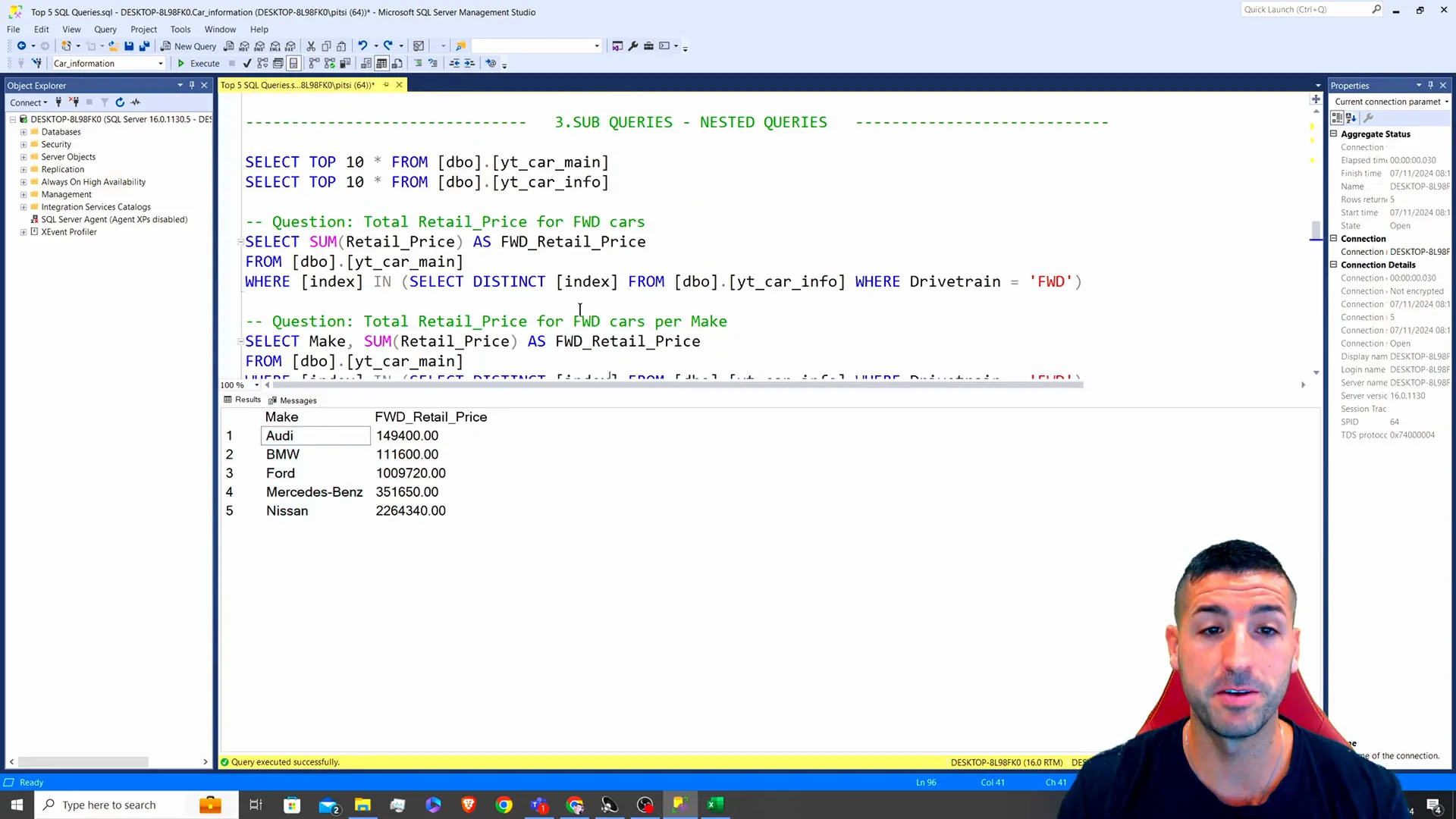
4. JOINs and Unions
Questions about JOINs are inevitable in SQL interviews. JOINs allow you to combine rows from two or more tables based on a related column.
For example, if asked to join the cylinders and torque from a secondary car information table:
SELECT a.*, b.cylinders, b.torque
FROM cars a
LEFT JOIN car_info b ON a.index = b.index;This LEFT JOIN retrieves all data from the primary table and matches it with the secondary table based on the index.
You might also need to filter results further, like so:
SELECT a.*, b.cylinders, b.torque
FROM cars a
LEFT JOIN car_info b ON a.index = b.index
WHERE a.make = 'Audi';Understanding the various types of JOINs is essential. You may encounter INNER JOIN, LEFT JOIN, RIGHT JOIN, and UNION operations.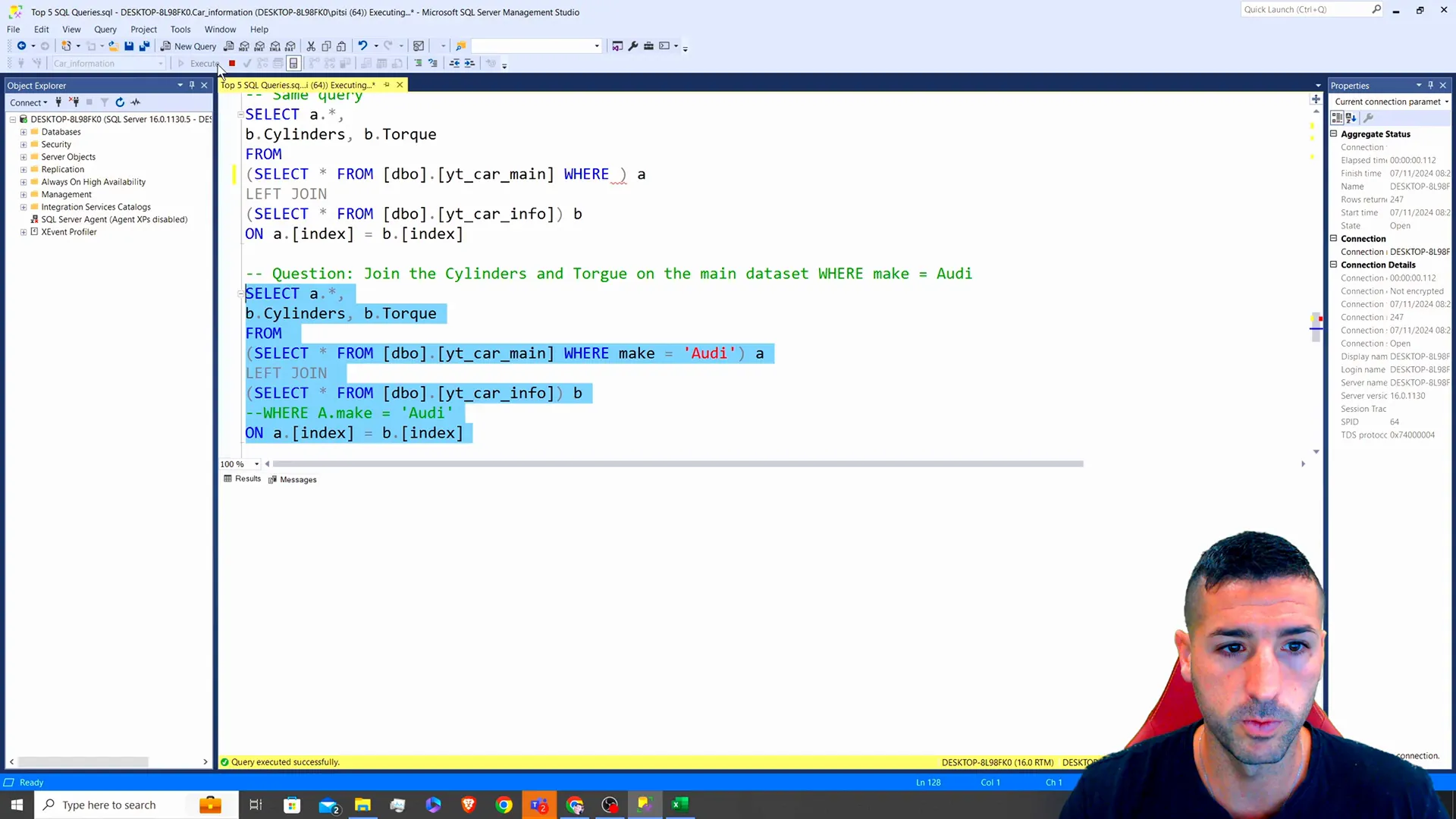
5. CASE Statements and Conditional Logic
Lastly, expect questions about CASE statements, which allow you to create conditional logic directly within your SQL queries.
For instance, to create a new column indicating whether a car’s retail price exceeds 100K:
SELECT *,
CASE
WHEN retail_price > 100000 THEN 'Yes'
ELSE 'No'
END AS PriceOver100K
FROM cars;Additionally, you might be asked to categorize cars into price ranges:
SELECT *,
CASE
WHEN retail_price < 30000 THEN 'Less than 30k'
WHEN retail_price BETWEEN 30000 AND 50000 THEN '30k to 50k'
WHEN retail_price BETWEEN 50000 AND 70000 THEN '50k to 70k'
WHEN retail_price BETWEEN 70000 AND 90000 THEN '70k to 90k'
ELSE '90k Plus'
END AS PriceCategory
FROM cars;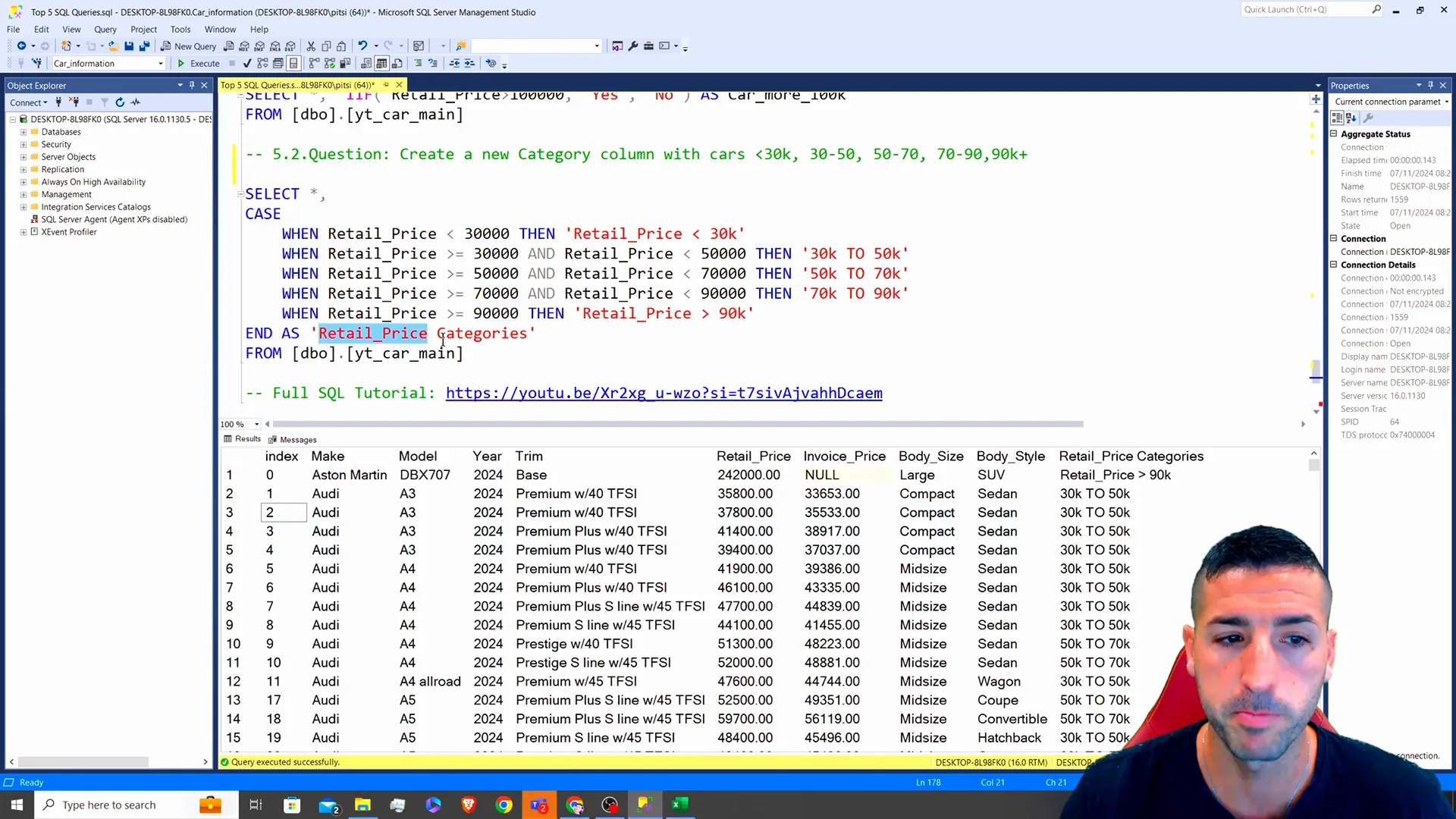
Conclusion
These top five SQL interview questions cover essential concepts that you should master before your interview. By practicing these examples and understanding the underlying principles, you’ll be well-prepared to tackle any SQL assessment that comes your way. For further practice, check out the coding examples available on my GitHub page.
If you found this guide helpful, please like, subscribe, and enable notifications for more SQL tips and tutorials. Best of luck in your SQL interview!
